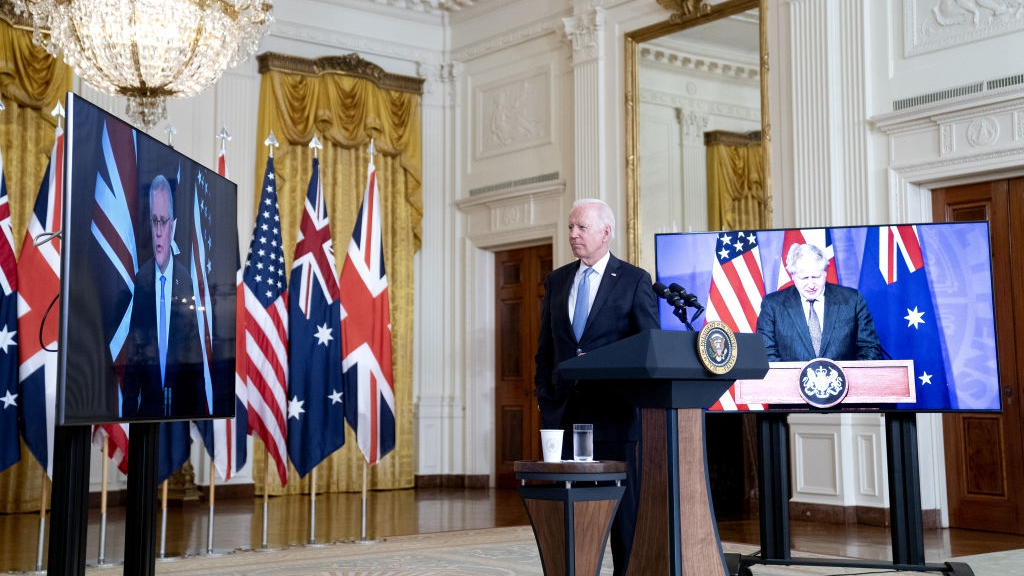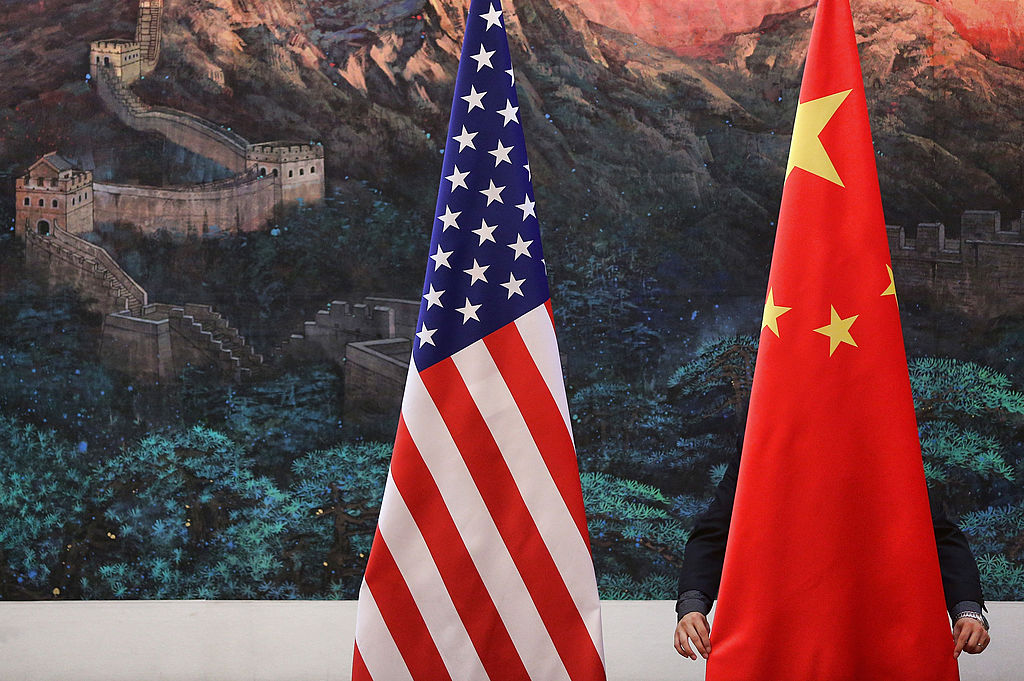
U.S. President Joe Biden listens as Scott Morrison, Australia's prime minister, left, speaks via videoconference in the East Room of the White House in Washington, D.C., U.S., September 15, 2021. /Getty
U.S. President Joe Biden listens as Scott Morrison, Australia's prime minister, left, speaks via videoconference in the East Room of the White House in Washington, D.C., U.S., September 15, 2021. /Getty
Editor's note: Stephen Ndegwa is a Nairobi-based communication expert, lecturer-scholar at the United States International University-Africa, author and international affairs columnist. The article reflects the author's opinions and not necessarily the views of CGTN.
One of the worst outcomes arising from the coordinated September 11, 2001, terrorist attacks in the United States by al-Qaeda was the further polarization of a world that was eventually healing from the Cold War. Not to lose such an opportunity, the U.S. played the Biblical Moses on Mount Sinai, dividing the world between those who supported it in the war on terror on the one hand and those who were against it on the other. There was no neutral ground.
The emerging dichotomy was epitomized by then U.S. President George W. Bush in his State of the Union address on January 29, 2002, when he coined the phrase "axis of evil" to describe countries that allegedly sponsored terrorism. These included isolating Iran, Iraq and DPRK as common enemies of the U.S.
Recently, the U.S. has escalated its war against China by crystallizing the so-called Quad alliance. Mooted as the Quadrilateral Security Dialogue following the devastating 2004 Indian Ocean tsunami, which claimed an estimated 230,000 lives and billions of dollars in damages, the four-country informal grouping comprises the U.S., Japan, India and Australia.
At the invitation of U.S. President Joe Biden on Monday, an in-person summit of this Indo-Pacific anti-China brotherhood will take place at the White House on September 24, the second after the first meeting in March was held virtually amid coronavirus concerns. The timing of the meeting is rather mischievous, taking place alongside the United Nations General Assembly (UNGA) in New York, which also started on Monday.
Of course, this is not a coincidence. Biden could be trying to legitimize his Quad baby to UNGA members. But it will be a hard sell for its obvious malicious, if not diabolical, agenda. The group is inimical to the interests of the global community due to its potential for inciting a geopolitical crisis that can revive the long-forgotten Cold War mentality.
To give impetus to the inimical Quad alliance, on September 15, Biden unveiled another front against China comprising Australia, the United Kingdom, and the United States (AUKUS). According to the U.S., the tripartite group was formed, like Quad, "to deepen diplomatic, security, and defense cooperation in the Indo-Pacific region," which is a euphemism for countering China's influence in the area.
The White House statement spells out a variety of interventions against China in the region ranging from military and trade to science and technology. Shockingly, the U.S. talks about arming Australia with nuclear-powered submarines, which leaves little to the imagination about what the U.S. sees as a confrontation with China in the region.

A man adjusts a Chinese flag at the Great Hall of the People in Beijing, China, September 5, 2012. /Getty
A man adjusts a Chinese flag at the Great Hall of the People in Beijing, China, September 5, 2012. /Getty
But then Chinese Foreign Ministry spokesperson Zhao Lijian warned against the formation of small cliques, like Quad and AUKUS, against other countries as history has shown such diabolical schemes end in total failure. Sustainable regional cooperation is based on mutual trust and cooperation among willing or like-minded countries, but not by members pursuing narrow-minded and sinister objectives.
For instance, observers wait to see the progress report from Quad's work plan in the March meeting. These included COVID-19 vaccines and climate and ensuring a free and open Indo-Pacific in the face of challenges from Beijing. But it does not take an expert to see that the only notable movement has been on the anti-Chinese agenda while the other two items have not moved.
The India COVID-19 crisis earlier this year exposed the futility of the Quad as the U.S. dithered on its nature of intervention with the pandemic, almost bringing the Asian country to its knees. On climate change, none can help the other in the Quad as they are all equally reeling under its negative effects.
Indeed, not everyone is fooled by the innocent façade of this U.S.-led initiative. An opinion published in TIME.com by Debasish Roy Chowdhury on March 18, 2021, aptly captured the reality on its title: "Quad is Key to Biden's Strategy in Asia, But the Four-Way Alliance Is Ambiguous and Contradictory." Chowdhury notes that while the Quad was fashioned into a kind of Asian NATO to act as a bulwark against a rising and assertive China, it is characterized more by its "confusing alliance logic, foundational contradictions and deliberate ambiguity."
Experts say the pattern of recent multi-pronged attacks by Quad is crystal clear. In May 2020, India provoked border skirmishes with China resulting in tens of casualties. Although Japan and China are not new to war, the former has been spoiling for a fight by meddling in its rival's internal affairs, particularly on matters related to Hong Kong Special Administrative Region, Taiwan region and Xinjiang Uygur Autonomous Region. Like the proverbial hyena, Australia is double-dealing, trying to play both ways with divided allegiances between the U.S. and China, and adopted anti-China policies akin to a Cold War at the behest of the U.S.
Well, those who do not learn from history are bound to repeat it. We are living in a new world characterized by new values that demand countries act in united multilateralism to survive. The days of the U.S. cracking the whip are echoes of a by-gone era.
(If you want to contribute and have specific expertise, please contact us at opinions@cgtn.com.)

